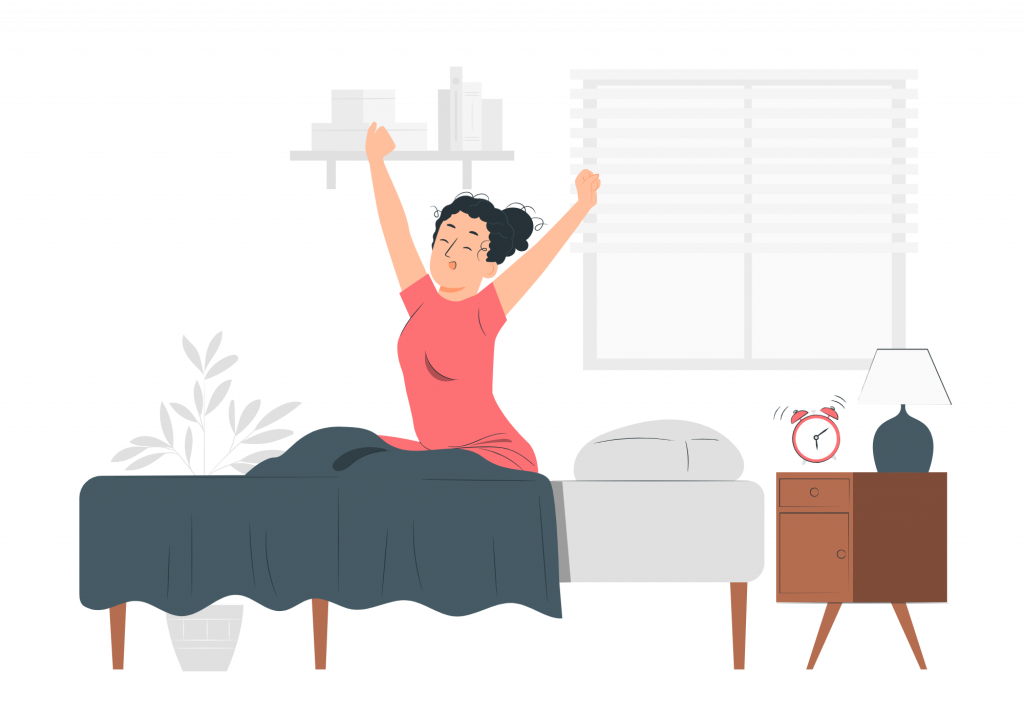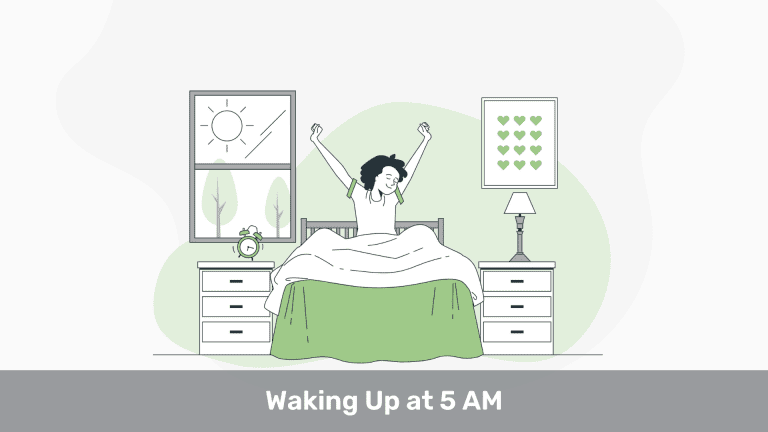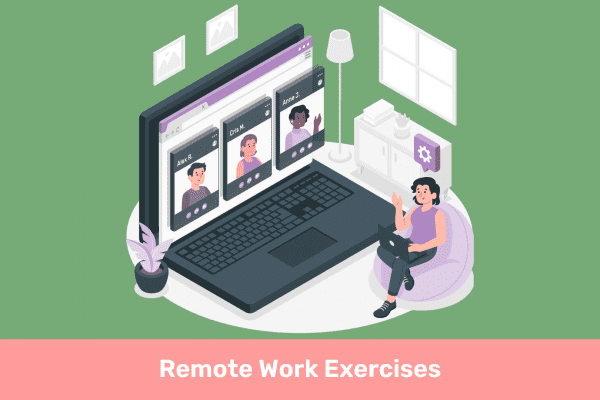Introduction
In a world characterized by constant demands on our time and attention, the concept of waking up at 5 AM has emerged as a powerful strategy for personal development and enhanced productivity. This intentional early rise has gained popularity not merely as a routine, but as a lifestyle choice embraced by individuals seeking a competitive edge in their daily pursuits.
According to a study conducted by the National Sleep Foundation, individuals who rise early tend to report higher levels of satisfaction with their lives. The study, which surveyed over 1,000 participants, revealed that early risers are more likely to have a positive outlook, attribute greater success to their personal lives, and exhibit a proactive attitude towards achieving their goals.
Now, you might be wondering, why the emphasis on 5 AM? Well, there’s something magical about this particular hour. It’s a time when the world is still and quiet, untouched by the hustle and bustle that comes later in the day. It’s your chance to claim a slice of time just for yourself – a moment to reflect, plan, and set the tone for the hours ahead.
As we delve into this discourse, it becomes evident that the decision to greet the day at this early hour transcends mere habit; rather, it is a deliberate commitment to self-improvement and optimized performance.
What is the 5 am rule?
The “5 AM Rule” is a concept popularized by various motivational speakers and self-help advocates, emphasizing the practice of waking up at 5 AM to enhance productivity, personal development, and overall success. The rule suggests that rising early provides individuals with a strategic advantage in structuring their day, fostering discipline, and pursuing long-term goals.
Key elements of the 5 AM Rule include:
- Early Start for Productivity: Proponents of the 5 AM Rule argue that waking up early allows individuals to get a head start on the day before external distractions and responsibilities arise. This quiet, uninterrupted time in the early morning is often considered ideal for focused work, goal-setting, and strategic planning.
- Personal Development Time: The early morning hours are seen as an opportune time for personal development activities such as reading, meditation, exercise, and self-reflection. By dedicating time to these activities before the demands of the day set in, individuals can invest in their mental, physical, and emotional well-being.
- Establishing Routine and Discipline: The 5 AM Rule is also about cultivating discipline through a consistent morning routine. Waking up at the same time each day establishes a structured start to the day, reinforcing discipline and creating a positive habit loop.
- Increased Energy and Focus: Advocates of the 5 AM Rule often claim that waking up early leads to increased energy levels and improved focus throughout the day. The quiet and stillness of the early morning may contribute to a sense of clarity and purpose.
- Alignment with Circadian Rhythms: Some proponents argue that waking up at 5 AM aligns with natural circadian rhythms, optimizing the body’s internal clock and promoting better sleep quality.
It’s important to note that the effectiveness of the 5 AM Rule varies from person to person, and not everyone thrives on an early waking schedule. Success and productivity are highly individualized, and factors such as sleep needs, lifestyle, and personal preferences should be considered when determining the suitability of this rule for an individual. While many find value in waking up early, it’s essential to prioritize sufficient and quality sleep to maintain overall well-being.
Benefits of Waking up at 5 am
- Starting the day early provides an opportunity to tackle important tasks before external distractions arise. The quiet and undisturbed early morning hours allow for focused and productive work.
- Waking up at 5 AM provides dedicated time for personal development activities such as reading, meditation, exercise, or goal-setting. This intentional self-care contributes to mental, emotional, and physical well-being.
- Consistently waking up at 5 AM helps establish a structured morning routine. Having a set routine can promote discipline, reduce decision fatigue, and create a positive start to the day.
- The early morning hours are often characterized by a sense of calm and quiet. This environment can lead to improved mental clarity, focus, and creativity, allowing for better problem-solving and decision-making.
- By starting the day early, individuals may find it easier to manage their time effectively, leading to a better balance between work, personal life, and leisure activities.
- Regular early risers often report improved sleep quality, as waking up early encourages a consistent sleep schedule. Additionally, exposure to natural morning light can help regulate circadian rhythms and improve overall sleep-wake cycles.
- Accomplishing tasks early in the day can create a sense of achievement and motivation. This positive momentum can set a positive tone for the rest of the day.
- Morning hours provide an excellent opportunity for physical activity, whether it’s a morning workout, a jog, or yoga. Regular exercise in the morning has been associated with numerous health benefits.
- The early morning offers a quiet time for self-reflection and goal-setting. This introspective time can contribute to personal growth and a greater sense of purpose.
- Waking up at 5 AM allows individuals to witness and appreciate the beauty of the sunrise. This simple pleasure can positively impact mood and overall outlook on the day.
Tips on waking up at 5 am
1. Establish a Consistent Sleep Schedule

Establishing a consistent sleep schedule is a crucial component of maintaining overall well-being and optimizing productivity. This involves adhering to a set routine for bedtime and waking up, promoting a healthy and restful sleep pattern. The key elements of establishing a consistent sleep schedule include:
Set a Regular Bedtime to Ensure Sufficient Sleep:
-
- Choose a specific time each night to go to bed. This bedtime should allow for the recommended 7-8 hours of sleep.
- Consider your individual sleep needs and lifestyle factors when determining the ideal bedtime.
- Avoid fluctuating bedtimes to regulate your body’s internal clock and enhance the quality of your sleep.
Aim for 7-8 Hours of Sleep Each Night:
-
- Recognize the importance of obtaining an adequate amount of sleep for overall health and cognitive function.
- Aim for a duration of 7 to 8 hours of sleep per night, as recommended by sleep experts and health professionals.
- Adjust your bedtime to accommodate your waking time, ensuring you prioritize sufficient rest.
Maintain a Consistent Sleep Schedule, Even on Weekends:
-
- Resist the temptation to deviate from your sleep schedule on weekends or days off.
- Consistency reinforces your body’s internal clock, making it easier to fall asleep and wake up at the desired times.
- If adjustments to your schedule are necessary, make them gradually to minimize disruptions to your sleep pattern.
2. Create a Relaxing Bedtime Routine

By creating a relaxing bedtime routine, you can signal to your body that it’s time to unwind and prepare for sleep. The goal is to create a peaceful and comfortable environment that encourages restful sleep and contributes to overall well-being.
Wind down before bed with calming activities:
-
- Engage in activities that promote relaxation, such as reading a book, taking a warm bath, or practicing gentle stretching exercises.
- Avoid stimulating or high-energy activities close to bedtime, allowing your body and mind to transition into a more relaxed state.
- Consider incorporating mindfulness or meditation techniques to quiet the mind and reduce stress before sleep.
Avoid electronic devices at least an hour before sleep:
-
- Limit exposure to screens from devices like smartphones, tablets, and computers at least an hour before bedtime.
- The blue light emitted by electronic screens can interfere with the production of melatonin, a hormone that regulates sleep, so reducing screen time helps signal to the body that it’s time to wind down.
- If using electronic devices is necessary, consider using blue light filters or “night mode” settings to minimize the impact on melatonin production.
Create a peaceful sleep environment:
-
- Ensure your bedroom is conducive to sleep by keeping it dark, quiet, and cool.
- Invest in comfortable bedding and pillows to enhance physical comfort.
- Consider using blackout curtains to block out external light and noise.
- Remove electronic devices or distractions from the bedroom to create a dedicated sleep space.
- Use calming scents, such as lavender, through essential oils or room sprays, to create a soothing atmosphere.
3. Place the Alarm Clock Across the Room

Placing the alarm clock across the room is a strategic technique aimed at promoting physical activity and reducing the likelihood of hitting the snooze button. This approach is designed to encourage individuals to get out of bed and engage in purposeful movement, fostering a more energetic start to the day. The three key components of this practice are as follows:
Position the alarm clock away from the bedside for physical activity:
-
- The intentional placement of the alarm clock at a distance from the bedside requires the individual to physically get out of bed to turn it off.
- This action initiates movement and helps overcome the initial resistance to leaving the comfort of the bed.
- By incorporating physical activity into the waking-up process, individuals can experience increased alertness and a quicker transition into an awakened state.
Use an alarm sound that is gentle but effective in waking you up:
-
- Choosing an alarm sound that is both gentle and effective is crucial to ensuring a pleasant waking experience.
- Opt for a tone or melody that gradually increases in volume or intensity, preventing a jarring or stressful awakening.
- The goal is to wake up in a calm and controlled manner, promoting a positive start to the day without inducing unnecessary stress.
Resist the temptation to hit the snooze button:
-
- Hitting the snooze button can disrupt the natural waking process and lead to fragmented, less restful sleep.
- Placing the alarm clock across the room makes it more inconvenient to hit snooze, as one must physically rise and walk to turn it off.
- Overcoming the temptation to snooze encourages a more disciplined and consistent waking routine, contributing to the establishment of healthier sleep patterns.
4. Prepare the Night Before

It is a key strategy in the process of waking up at 5 AM, aimed at creating a smoother and more efficient morning routine. This proactive approach involves taking care of various tasks and decisions the night before to minimize stress and enhance the likelihood of a successful early wake-up. Here’s a breakdown of the components involved:
Lay out clothes and essentials the night before:
-
- This involves selecting and setting out the clothing you plan to wear the next day.
- Ensure that all necessary accessories, such as shoes, jewelry, or outerwear, are also prepared.
- Organizing essential items such as keys, wallet, and work materials in a designated spot makes it easier to grab and go in the morning.
Plan breakfast or have it prepared in advance:
-
- Consider deciding on your breakfast menu the night before to save time and make healthier choices.
- Preparing simple breakfast items, like overnight oats or pre-cutting fruits, can significantly reduce morning meal preparation time.
- If you prefer a hot breakfast, consider prepping ingredients or even preparing part of the meal the night before.
Reduce morning decisions to streamline the waking-up process:
-
- Minimize decision fatigue by making choices about non-essential matters in the evening.
- This might involve choosing what tasks to prioritize in the morning, what to pack for lunch, or even deciding on a specific focus for your early morning hours.
- Having a plan in place for the morning reduces the need for impromptu decision-making, allowing for a more efficient and less stressful start to the day.
5. Find Motivation

Set Clear Goals for the Morning to Motivate Yourself:
-
- Setting specific and achievable goals for your early morning hours provides a tangible reason to get out of bed.
- These goals can be related to personal development, work, or health. By defining clear objectives, you create a sense of purpose and direction for the morning, making it easier to overcome the initial resistance to leaving the comfort of your bed.
- Whether it’s completing a workout, dedicating time to a passion project, or engaging in a mindful activity, having a goal in mind helps anchor your motivation and provides a sense of accomplishment.
Focus on the Benefits of Waking Up Early:
-
- Understanding and internalizing the benefits of waking up early can serve as a powerful motivator.
- Early risers often experience increased productivity, improved mental clarity, and a better work-life balance.
- By reminding yourself of these advantages, you create a positive association with the act of waking up at 5 AM.
- Consider the extra time gained for personal development, the peacefulness of the early morning hours, and the opportunity to set a positive tone for the entire day.
- Focusing on these benefits reinforces the value of the habit and reinforces your commitment to it.
Establish a Purpose for Your Early Morning Hours:
-
- Beyond setting goals, establishing a broader purpose for your early morning hours adds depth to your motivation.
- Consider the overall impact you want your morning routine to have on your life. This purpose could involve self-improvement, pursuing long-term goals, or simply creating a space for self-care and reflection.
- By aligning your early waking hours with a meaningful purpose, you infuse your routine with a sense of meaning and significance. This overarching purpose acts as a guiding force, reminding you of the larger context and importance of your morning ritual.
6. Engage in Morning Rituals

Engaging in morning rituals involves establishing a set of intentional and positive activities that you perform consistently upon waking up at 5 AM. These rituals not only help kickstart your day but also contribute to your overall well-being. Here’s a breakdown of the key components:
Start with a Positive Activity, Such as Stretching or Meditation:
-
- Stretching: Incorporating gentle stretching exercises into your morning routine helps awaken your muscles and increase blood flow, promoting physical flexibility and overall vitality.
- Meditation: Starting the day with a brief meditation session can set a positive tone for the day. It allows you to cultivate mindfulness, reduce stress, and enhance mental clarity, preparing you for the challenges ahead.
Incorporate Activities You Enjoy to Make Waking Up More Appealing:
-
- Personalized Activities: Choose activities that resonate with your interests and preferences. Whether it’s listening to music, sipping on your favorite tea, or spending a few moments in nature, incorporating enjoyable elements makes waking up early more appealing.
- Create a Pleasant Environment: Make your morning space inviting. Consider soft lighting, pleasant scents, or calming sounds to create an atmosphere that encourages a positive start to the day.
Use Morning Time for Personal Development:
-
- Reading: Dedicate some time in the morning to reading, whether it’s a few pages of a book, articles, or inspirational quotes. This contributes to personal growth, expands knowledge, and provides a mental boost.
- Goal-Setting: Reflect on your personal and professional goals. Use the early morning hours to outline your priorities for the day, week, or even longer-term objectives. This helps provide a sense of direction and purpose.
7. Hydrate and Fuel Your Body

Hydrating and fueling your body in the morning is a crucial component of establishing a healthy and energizing routine. This practice sets the foundation for optimal physical and mental performance throughout the day. Here’s a breakdown of the key components:
Drink a Glass of Water Upon Waking to Rehydrate:
-
- After a night’s sleep, the body can become mildly dehydrated. Drinking water immediately upon waking helps rehydrate the body and kick starts various bodily functions.
- Hydration is essential for metabolism. Water helps in the process of breaking down food and converting it into energy, which is particularly crucial in the morning to jumpstart your metabolism.
- Water flushes out toxins that accumulate in the body overnight, supporting the natural detoxification process.
Have a Nutritious Breakfast to Kickstart Your Metabolism:
-
- Breakfast is often referred to as the most important meal of the day. It replenishes glucose levels, providing energy for the brain and muscles.
- Aim for a well-balanced breakfast that includes a mix of carbohydrates, proteins, and healthy fats. This combination provides sustained energy and helps maintain blood sugar levels.
- Incorporate fiber-rich foods like whole grains, fruits, and vegetables to support digestion and promote a feeling of fullness.
Avoid Excessive Caffeine Intake, Especially in the Evening:
-
- While moderate caffeine intake can provide a temporary energy boost, excessive consumption, especially later in the day, can disrupt sleep patterns and contribute to dehydration.
- Limit caffeine intake in the evening to avoid interference with the natural sleep-wake cycle. Consider switching to decaffeinated options in the afternoon and evening.
- Balance caffeinated beverage intake with water to stay adequately hydrated. Caffeine has diuretic effects, which can increase fluid loss and the need for additional water consumption.
Also Read: 30-day Water Challenge
8. Exercise in the Morning

Exercise in the morning is a powerful component of a healthy lifestyle, offering numerous physical and mental benefits. By incorporating physical activity into your morning routine, you set a positive tone for the day and contribute to overall well-being.
Incorporate Physical Activity into Your Morning Routine:
-
- Consistency: Establishing a regular morning exercise routine helps create consistency in your daily schedule. Consistency reinforces the habit and makes it easier to adhere to over time.
- Boosted Metabolism: Morning exercise has been shown to boost metabolism, aiding in weight management and promoting overall metabolic health.
- Enhanced Energy Levels: Engaging in physical activity in the morning can provide a natural energy boost, setting a positive and invigorating tone for the rest of the day.
- Improved Mood: Exercise releases endorphins, which are neurotransmitters that promote feelings of happiness and reduce stress. Starting your day with exercise can positively impact your mood and mental well-being.
Choose Exercises You Enjoy for a Positive Experience:
-
- Personal Preference: Select activities that align with your personal preferences and interests. Whether it’s jogging, yoga, weightlifting, or dancing, choosing enjoyable exercises increases the likelihood of sticking to your routine.
- Variety: Incorporate a variety of exercises to keep your routine interesting and challenging. This prevents boredom and ensures a well-rounded approach to fitness.
- Adaptability: Tailor your morning workout to your fitness level and goals. As you enjoy the activities you choose, you’ll be more motivated to stick with your routine in the long run.
Enjoy the Fresh Air During Outdoor Workouts:
-
- Nature’s Benefits: Taking your exercise routine outdoors allows you to enjoy the benefits of fresh air and natural surroundings. Exposure to nature has been linked to improved mood and reduced stress.
- Increased Motivation: The changing scenery and the revitalizing effect of nature can boost your motivation to exercise. Outdoor workouts provide a break from indoor routines and add variety to your fitness regimen.
- Vitamin D: Morning sunlight is a natural source of vitamin D, essential for bone health and overall well-being. Outdoor workouts give you the opportunity to soak in some sunlight, contributing to your daily vitamin D intake.
9. Stay Accountable

“Stay Accountable” is a crucial aspect of successfully adopting the habit of waking up at 5 AM daily. This involves actively involving others in your goal, leveraging support structures, and monitoring your progress to ensure continued motivation. Here’s a breakdown of the key components:
Share your goal with a friend or family member:
-
- This involves communicating your commitment to waking up at 5 AM to someone close to you.
- Sharing your goal creates a sense of accountability as others become aware of your intentions.
- Choose someone who can provide encouragement, understanding, and perhaps even join you in the endeavor.
Join a morning accountability group or partner:
-
- Seek out like-minded individuals who share the goal of waking up early.
- Joining a group or finding an accountability partner adds a social and supportive dimension to your commitment.
- Accountability groups or partners can provide motivation, share experiences, and offer practical tips to overcome challenges.
Track your progress and celebrate successes:
-
- Maintain a record of your waking up at 5 AM journey, noting each day’s success or any challenges faced.
- Tracking progress helps you stay focused on your goal and provides a tangible measure of your commitment.
- Celebrate small victories, whether it’s successfully waking up early for a week or achieving specific milestones. Recognition of achievements reinforces positive behavior.
10. Be Patient and Adjust Gradually

Waking up at 5 AM daily is a process that requires time, patience, and a realistic approach. This concept is based on the understanding that immediate and drastic changes to one’s routine may lead to burnout or increased difficulty in maintaining the habit over the long term. The key components of this principle can be broken down as follows:
Understand that forming a new habit takes time:
-
- Acknowledge that habits, especially those related to waking up early, do not develop overnight.
- Recognize that behavioral changes require a consistent effort and a gradual adjustment period.
Start by waking up slightly earlier and adjust gradually:
-
- Instead of attempting to wake up at 5 AM immediately, begin by setting the alarm for a slightly earlier time than your current wake-up time.
- Gradually adjust the wake-up time in small increments, giving your body and mind the opportunity to adapt without overwhelming yourself.
Listen to your body and make adjustments as needed:
-
- Pay attention to how your body responds to the new wake-up time.
- If you find it challenging or experience excessive fatigue, consider making smaller adjustments or allowing yourself more time to adapt.
- Be flexible in your approach, understanding that individual sleep needs and daily schedules may vary.
11. Evaluate and Reflect
![]()
It is a critical aspect of the process when adopting the habit of waking up early at 5 AM. This stage involves a thoughtful analysis of the impact of the early rising routine on various aspects of one’s life. Here’s a breakdown of the components involved:
Regularly assess how waking up early impacts your day:
-
- Morning Productivity: Consider how waking up early affects your productivity levels during the early hours of the day. Are you able to accomplish tasks more efficiently? Do you feel a sense of accomplishment in the morning?
- Energy Levels: Evaluate your energy levels throughout the day. Take note of whether waking up at 5 AM contributes to sustained energy and focus or if there are noticeable energy dips.
- Mood and Well-being: Reflect on your overall mood and well-being. Does early rising positively impact your mental and emotional state? Are you experiencing a more positive outlook on your day?
Make adjustments to your routine based on what works best:
-
- Sleep Quality: Assess the quality of your sleep. If you find that waking up at 5 AM is impacting your sleep negatively, consider adjusting your bedtime or sleep environment.
- Task Prioritization: Review the tasks you engage in during the early morning hours. Adjust your routine based on the importance of tasks and how well they align with your goals.
- Flexibility: Be open to making changes to your routine. If certain aspects of your early morning routine are not working, be flexible in adapting them to better suit your needs.
Reflect on the positive changes and adjust as needed:
-
- Celebrate Achievements: Acknowledge and celebrate the positive changes that have resulted from waking up early. Recognize accomplishments, both big and small, that have contributed to your overall well-being and goals.
- Identify Challenges: Reflect on any challenges or obstacles you may have encountered. Consider whether these challenges are related to the early waking time or other aspects of your routine. Identify areas for improvement.
- Continuous Improvement: Embrace a mindset of continuous improvement. As you reflect on positive changes and challenges, use this information to make ongoing adjustments to your routine. Strive for a balance that optimizes your overall lifestyle and well-being.
Final Thoughts
The practice of waking up at 5 AM holds the potential to transform not just our mornings but our entire lives. The benefits, ranging from increased productivity and personal development to improved mental clarity and overall well-being, underscore the positive impact of embracing this early rising routine. As we navigate the journey toward waking up at 5 AM, it’s essential to remain flexible, continuously evaluate our experiences, and celebrate the positive changes that unfold.
At Woliba, we understand the challenges and rewards associated with adopting the habit of waking up early. Our extensive resource library is designed to provide valuable insights, tips, and guidance to support individuals in their journey towards becoming early risers. Whether you’re seeking motivation, practical advice, or strategies for overcoming obstacles, Woliba’s curated collection of resources offers a wealth of information.
Contact us now and take the first step towards a more energized and purposeful life.





